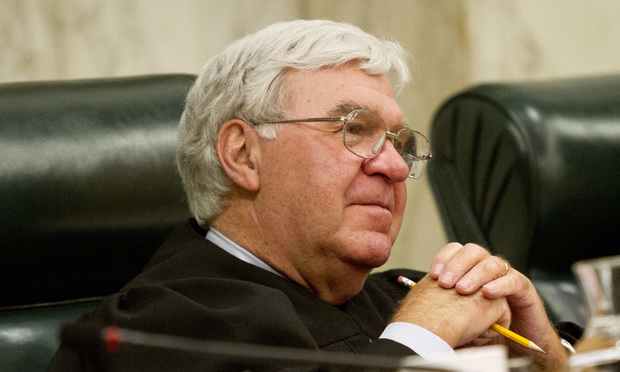Ga. Supreme Court Throws Out 25-Year-Old Murder Convictions Against Three Soldiers
They were 20 and 21 and just returned from Iraq and Korea when they were arrested for a crime their lawyer said they knew nothing about and were nowhere near. They're now in their mid-40s.
November 02, 2017 at 07:15 PM
4 minute read
 Chief Justice P. Harris Hines, Supreme Court of Georgia (Photo: John Disney/ALM)
Chief Justice P. Harris Hines, Supreme Court of Georgia (Photo: John Disney/ALM) The Georgia Supreme Court on Thursday reversed the murder convictions of three U.S. servicemen who have been in prison for the past 25 years.
They were 20 and 21 and just returned from Iraq and Korea when they were arrested for a crime their lawyer said they knew nothing about and were nowhere near. They're now in their mid-40s.
Chief Justice P. Harris Hines wrote for a unanimous court, ruling that prosecutors improperly withheld evidence from the defense that likely would have changed the outcome of the trial.
Mark Jason Jones, Kenneth Eric Gardiner and Dominic Brian Lucci, who are white, were stationed at the Fort Stewart Army base near Savannah when they were found guilty in November 1992 of murdering Stanley Jackson, an African-American. Jackson was shot in the street with a high powered assault rifle, possibly an AK-47, and left dead in an intersection. A witness identified two of the men as the shooters, hanging out the windows of their 1992 Chevrolet Cavalier firing rapidly, and said a third man was driving.
All three were convicted of malice murder and possession of a firearm during the commission of a crime and sentenced to life in prison plus five years. In June 1994, the Supreme Court upheld their convictions, according to a summary provided by the court's public information office. The case was heard on a habeas appeal.
After an Open Records Act request in 2010, defense attorneys learned that the police had withheld evidence in the form of a document called the “Yamacraw Report.” That critical police report documented a similar racially-motivated incident on the same night as Jackson's murder but after the three men were already in custody. According to that report, about three hours after the servicemen were arrested, white men with military-style haircuts and carrying semi-automatic weapons drove through the Yamacraw Village public housing project, threatening “to shoot blacks who hung out on street corners.” A citizen reported the incident to a police officer who wrote a report that made its way into the Stanley Jackson police case file. But the report was never disclosed to the defendants' defense counsel and only came to light after the 2010 Open Records Act request.
Also, the defense counsel told the court, the eye witness had first told police he could not identify the shooters and was coerced into testifying differently, according to the summary.
Attorney General Chris Carr and others in his office represented the state. A spokesman for Carr said they were still reviewing the opinion and had not determined whether to seek a new trial.
The defense attorneys are Steven Lee Sparger of Savannah and Peter Camiel of Camiel & Chaney in Seattle.
“We are thrilled,” Camiel said. “These three young soldiers—20 and 21—have been in prison for 25 years for something they had nothing to do with.”
Camiel said all three soldiers were at a wedding rehearsal for one of them in Hinesville—about an hour from Savannah—until 9:30 p.m. the night of the 10 p.m. shooting. They went to Savannah for a bachelor party but didn't arrive until after the crime. They were pulled out of a bar and arrested at 11 p.m. Camiel said the police responded to another similar incident at 1 a.m., but the prosecutors kept it out of the trial.
Two of the men had just returned from Iraq, the other from Korea. The wedding that was to be the next day never happened, Camiel said.
Camiel works with Centurion Ministries, an innocence project headquartered in Princeton, New Jersey. He said, unlike many innocence project cases, this one had no DNA evidence to use to exonerate the clients. No weapon was ever found in the servicemen's car.
While the state could retry the case, Camiel said, “I'd be shocked if they do.” He said the eyewitness—who was watching from his porch across a street in the dark—has recanted his identification testimony.
“What should happen,” said Camiel, “is that these men should go home.”
This content has been archived. It is available through our partners, LexisNexis® and Bloomberg Law.
To view this content, please continue to their sites.
Not a Lexis Subscriber?
Subscribe Now
Not a Bloomberg Law Subscriber?
Subscribe Now
NOT FOR REPRINT
© 2025 ALM Global, LLC, All Rights Reserved. Request academic re-use from www.copyright.com. All other uses, submit a request to [email protected]. For more information visit Asset & Logo Licensing.
You Might Like
View All
Troutman Pepper Says Ex-Associate Who Alleged Racial Discrimination Lost Job Because of Failure to Improve
6 minute read
Apply Now: Superior Court Judge Sought for Mountain Judicial Circuit Bench
3 minute read
Law Firms Expand Scope of Immigration Expertise Amid Blitz of Trump Orders
6 minute read
Bass Berry & Sims Relocates to Nashville Office Designed to Encourage Collaboration, Inclusion
4 minute readTrending Stories
Who Got The Work
J. Brugh Lower of Gibbons has entered an appearance for industrial equipment supplier Devco Corporation in a pending trademark infringement lawsuit. The suit, accusing the defendant of selling knock-off Graco products, was filed Dec. 18 in New Jersey District Court by Rivkin Radler on behalf of Graco Inc. and Graco Minnesota. The case, assigned to U.S. District Judge Zahid N. Quraishi, is 3:24-cv-11294, Graco Inc. et al v. Devco Corporation.
Who Got The Work
Rebecca Maller-Stein and Kent A. Yalowitz of Arnold & Porter Kaye Scholer have entered their appearances for Hanaco Venture Capital and its executives, Lior Prosor and David Frankel, in a pending securities lawsuit. The action, filed on Dec. 24 in New York Southern District Court by Zell, Aron & Co. on behalf of Goldeneye Advisors, accuses the defendants of negligently and fraudulently managing the plaintiff's $1 million investment. The case, assigned to U.S. District Judge Vernon S. Broderick, is 1:24-cv-09918, Goldeneye Advisors, LLC v. Hanaco Venture Capital, Ltd. et al.
Who Got The Work
Attorneys from A&O Shearman has stepped in as defense counsel for Toronto-Dominion Bank and other defendants in a pending securities class action. The suit, filed Dec. 11 in New York Southern District Court by Bleichmar Fonti & Auld, accuses the defendants of concealing the bank's 'pervasive' deficiencies in regards to its compliance with the Bank Secrecy Act and the quality of its anti-money laundering controls. The case, assigned to U.S. District Judge Arun Subramanian, is 1:24-cv-09445, Gonzalez v. The Toronto-Dominion Bank et al.
Who Got The Work
Crown Castle International, a Pennsylvania company providing shared communications infrastructure, has turned to Luke D. Wolf of Gordon Rees Scully Mansukhani to fend off a pending breach-of-contract lawsuit. The court action, filed Nov. 25 in Michigan Eastern District Court by Hooper Hathaway PC on behalf of The Town Residences LLC, accuses Crown Castle of failing to transfer approximately $30,000 in utility payments from T-Mobile in breach of a roof-top lease and assignment agreement. The case, assigned to U.S. District Judge Susan K. Declercq, is 2:24-cv-13131, The Town Residences LLC v. T-Mobile US, Inc. et al.
Who Got The Work
Wilfred P. Coronato and Daniel M. Schwartz of McCarter & English have stepped in as defense counsel to Electrolux Home Products Inc. in a pending product liability lawsuit. The court action, filed Nov. 26 in New York Eastern District Court by Poulos Lopiccolo PC and Nagel Rice LLP on behalf of David Stern, alleges that the defendant's refrigerators’ drawers and shelving repeatedly break and fall apart within months after purchase. The case, assigned to U.S. District Judge Joan M. Azrack, is 2:24-cv-08204, Stern v. Electrolux Home Products, Inc.
Featured Firms
Law Offices of Gary Martin Hays & Associates, P.C.
(470) 294-1674
Law Offices of Mark E. Salomone
(857) 444-6468
Smith & Hassler
(713) 739-1250






